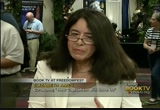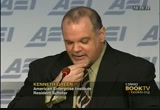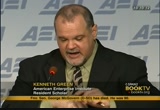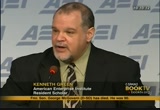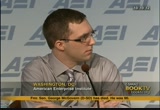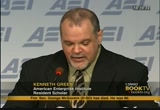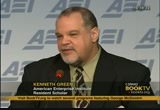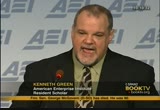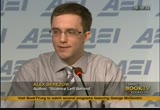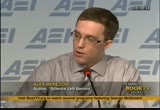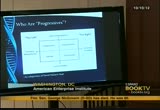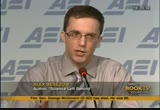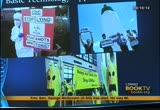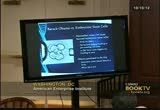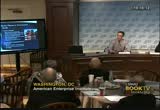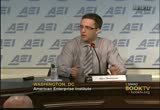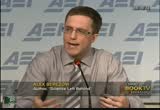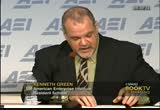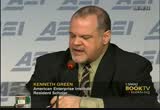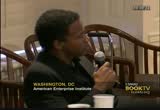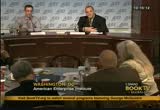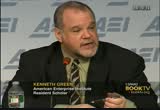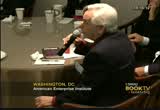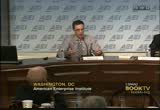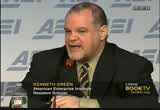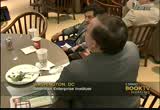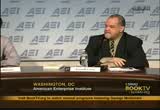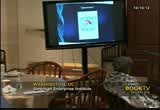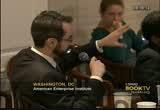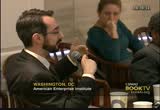tv Book TV CSPAN October 21, 2012 10:00am-11:30am EDT
10:00 am
>> is risky markets. he did a very good job in this hearing pushing back and explaining. i think what is really important right now is people who don't understand markets or don't like markets are demonizing risk when you invest money. the whole point is you may or may not succeed. it may not work out. and that unfortunately is what happens. and you know, if you don't have risk commute on every word. if you don't invest, all of these great companies i brought up today were at one time whiskey investments and they worked out. >> this is booktv on c-span 2 on location at freedom fest. we been talking the elizabeth ames, the co-author of this book, "how capitalism will save us" and the co-author of this upcoming book, freedom manifesto: why free markets are moral and big government isn't. we will be talking with her co-author, steve forbes as well about this book.
10:01 am
.. >> so i'm very excited to have the event today on science, called science left behind on alex's great book. but before we start if i seem a little fuzzy, you've seen the commercials that go something like this, when you pay too much for cable, you throw things, when you throw things, people think you have anger issues. when your schedule clears up,
10:02 am
you grow a scraggly beard, and when you start taking in stray animals, you can't stop taking in stray animals, don't pay too much for cable. [laughter] i have my own version. your doctor insists you have a checkup. he insists you have the flu shot and a tetanus booster. you wake up the next day feeling you've been beaten by a grill la with a -- gorilla with a baseball bat. i haven't yet wandered out into the street. if i seem to be heading that way, please, stop me. so today's event, there's been a battle going on for some time now in dueling books and sharp exchanges on the internet and the blogosphere over whether or not one side of the political spectrum is more anti-scientific than the other. a leading advocate for the
10:03 am
conservatives is a fellow named christopher mooney who wrote the republican war on science. mooney's argued so many hold orthodox views as to make the entire political philosophy anti-science and anti-scientific. others, including myself and alex -- this is how we actually met -- have pointed out the situation is far from clear as progressives have a whole host of positions that can be described as anti-science from their scare mongering to their embrace of things such as the linear no threshold model of toxicity to the fixation on organic agriculture and tolerance of the anti-vaccine movement although i'm having second taughts about that. [laughter] thoughts about that. there's a whole host of issues where the left is anti-science, as you can imagine. some of our journal itselfs are beginning to -- journalists are beginning to catch on to this, and i would point you to keith
10:04 am
brewer who has been steadily moving to a position of let's call it the way it is, both sides have their issues and problems. the left's particular fixation on genetically-modified foods, of course, is killing many, many, many people. but until now the response to mooney has been a somewhat scatter shot with just blog shuts and articles and things like that until now. alex berezow, editor of real clear science, and his co-author hank campbell, founder of science 2.0, an online science community, have brought together the various strands in the progressive part of the political spectrum, and they actually do something i really respect which is they start the book by defining what progressives are. as a scientist myself, it's really refreshing when somebody starts an actual book by saying, okay, let's talk about the
10:05 am
definition of things so we know what we're talking about. alex's doctoral is in microbiology, but it's clear that his scientist education did not go in vain, was not in vain. when i got my copy, i went through the chapter that i would be able to judge best on energy and environment or chapter five, crappy conservation and clean energy chaos. i happen to love alliteration myself, so i got a freebie in that title. and i was pleased to see they take on the crazier aspects favored by progressives from low-flow toilets that don't work to showerheads that hiss at you rather than get you clean, um, and they point out some very good points about water conservation where if you really were worried about water conservation, you wouldn't be worried about showerheads and toilets because most of the water use is industrial. for energy use, in fact, you
10:06 am
have to get all the way down to a 1% level that you would then be trying to knock that down by a tenth of a percent or so by going to smaller toilets and hissing showers. i'm hoping that one of the things they also discuss is one of my pet peeves which is the willingness of progressives to sacrifice the environment for their pet project. and this is actually what got me into public policy. when i was a kid, i was raised by my mother who was a birth crazy. she was a treasure hunter, actually, she loved to go prospecting for gold and metal detecting for coins. so i spent many summers out in the mojave desert where we had a mining claim. and she she would tell people we'd go digging for gold, and what she meant was i would to digging -- go digging for gold, and she would go panning once i had done all the digging. there are actual whole groups of prospectors, and we were involved in one in california. and this was 1973, perhaps be,
10:07 am
'74, the environmentalists were trying to get the mining act revised to stop the ownership of mining claims in the mojave desert because of the kangaroo rat that was endangered and the desert tortoise were endangered. and that was my introduction to the tension between mixed use and nonuse. the environmentalists were simply adamant that they were going to wall off the entire mojave desert for use, and they did, in fact. it became impossible to use recreational vehicles, and wound up giving up our claim. now, of course, when they want to put solar installations out there, they talk to the vinylallists, and they talk about gentle mowing of the tops of the cacti that take 100 years to grow back. they relocated a bunch of tortoises even though the mortality rate is ridiculously high when you move them, and
10:08 am
kangaroo rats no longer matter because they want their solar fields. and the same is true where since they happened to notice people don't live out in the mojave desert s so it's okay to run the power mines through state park -- power lines through state parks to get them to the cities. so with that, i'm going to turn this over to alex who will step us through the feel-good fallacies and the rise of the anti-scientific left. we'll have time for q&a afterward because i'm going to reach behind alex and pop him with the book if he runs too late. but over to you, and thank you for joining us. alex? >> thank you for that very kind introduction. our book is "science left behind." we call it feel-good fallacies and the rise of the anti-scientist left. and as ken said, my name's alex, and i got my ph.d. in microbiology, and i'm the editor of real clear science.com.
10:09 am
just a little bit about me, my background is entirely microbiology. a friend of mine said i looked like an ubergeek in that picture. that's me working in an anaerobic chamber. we grew all sorts of extremely smelly bacteria this that thing. i went to the university of washington 2004 and got my be ph.d. in 2010, and identify been in the real -- i've been in the real world for two years. so my personal science philosophy is straightforward and simple. science should always come before politics x that means ideology or political parties are not beyond criticism. so if my, in my view here i play for team science. i don't come to a talk playing for team red or team blue, i play for team science. and i think that we should always try to purge
10:10 am
anti-scientific thinking even if it comes from our friends and our political allies. so then why "science left behind," why pick on the left? well, the media is very quick to cover anti-scientific beliefs from conservatives, in particular global warming and evolution. todd aiken, for instance, made some rather unenlightened comments about pregnancy, and for days this was a front page story about how he doesn't understand reproductive biology. however, when someone on the far left does something, when president barack obama says that vaccines might cause autism, that was ignored. and, yes, he did say that. we'll talk about that later in the talk. so, also, there have already been several books published on the topic. chris mooney's one of them, there's a couple other books. so if you want to find out how the right is bad at science, there's already a lot of that. to our knowledge, this is the first book on the anti-scientific left.
10:11 am
>> let's give the dell -- devil his due, bob -- [inaudible] wrote a book within months of yours, at the same time. >> oh, okay. and progressives are anti-science as well, it's just it's not reported the media. the media looks the other way when their political allies do things that are anti-science. what do we mean by progressives? well, we took david no lab's chart here -- nolan's chart and relabeled it to fit our political ideology today. conservatives and libertarians are the easiest to identify, libertarians need no introduction, i think. the ron paul revolution, bring us back to the constitution. the left, however, though is a little bit trickier to define because i see them as splitting into liberals and conservatives -- liberals and progressives. liberals being more like the toni ty blair, the bill clinton wing of the democratic party. pro-business, but they do tend to favor economic outcomes, so
10:12 am
they want to control economic outcomes. that's their main focus. think of unionized police officers, unionized teachers. progressives are an entirely different beast. these are the people who, the typical tree-hugging, san francisco liberals, progressives. that's who we're talking about. these are the people who are interested in not just economic outcomes, but also social outcomes. so whereas conservatives are interested in talking about drugs and sex, progressives are interested in talking about whether or not you can put salt on your french fries and whether or not you can have a plastic bag or drink a soda. michael bloomberg, great example of a progressive. he's banning currents in new york city. that -- cups in new york city. so that's what we're talking about. the eyedology of the left, the progressive ideology. so what are some myths that are commonly held by today's progress i haves? we've got about five myth, but we tend to focus on the first
10:13 am
two because those are where the big, juicy ideas, the bad ideas are, actually. one is that natural things are good. two, unnatural things are bad. three, unchecked science will destroy us. four, science is only relative anyway. and, five, science is on our side. okay. the first one -- we actually won't have much time to get into these myths. if you want to get my book, you'll learn all about them there. we're going to talk mostly about the most famous progressive today, president barack obama, and his resumé when it comes to science. but just to give you an idea of why these myths are important, matchal things -- natural tings are good. that's behind the rejection of genetically-modified food. unnatural things are bad. that's the fear of chemicals, the fear of chemistry, things that are unnatural, the fear of pesticides, fertilizers. unchecked science will destroy
10:14 am
us. that's the fear of nuclear power. how can we let people build nuclear power plants? they're going to kill everybody. science is only relative anyway. what do scientists know? and, of course, five scientists being on our side, progressives believe that science is on their side. so what are the results of these myths? well, protests and lots of protests. just to give you some idea of the topics that we cover in our book, the top left we have cdc stop lying, flu shots are toxic. i know ken might agree, they actually are toxic now after his experience. [laughter] so we have someone, a protester saying that vaccines are toxic and the centers for disease control, the most respected microbiological organization in the world is lying to you about vaccines. on the right we have, upper right we have a big baby bottle, that's the bpa movement. don't give your babies milk from
10:15 am
baby bottles, because they'll all die from the plastic the baby bottle is made from. and on the bottom, this is the anti-genetic modification movement. these are the demon corn because corn has, is genetically-modified to have a toxin in it to kill insects. we told our publisher we wanted this for the cover, and he said, you're crazy, we're not putting that on the cover of the book. there you go, that's the cover we wanted. also, basic scientific research has been opposed by members of the progressive left. the upper corner, don't test on my friends, they're opposed to all animal research. keep in mind this isn't just chimpanzee research or primate research, big primates like gorillas. they're opposed to almost all animal research, no mice, no rats, pretty much all of our medical research comes from mice and rats and, actually, some of the smaller primates like rhesus
10:16 am
monkeys. upper right corner, there's a sign in a yard that says stop bothering us, we support science. you may not be able to see what happened. this was in los angeles. there was a neighborhood of scientists that live in an area, and protesters would not protest at the university, they would find out where the researchers lived and would protest outside their house. and this, of course, is fright opinioning for scientists. in fact -- frightening for scientists. when i was at the university of washington, we would get e-mails saying that the animal rights protesters were back, be careful, don't engage with them. because they have a history of violence and intimidating researchers. just to give you an idea how loony these people are, one of these neighbors puts up a sign, he was in support of his neighbor, one of the animal researchers crossed off science and said torture, we support
10:17 am
torture. that is how they view people like me and ken. we're torturers. we're not helping people, we're not helping medical science, we're animal torturers. the bottom right, lawrence summers who was fired from harvard, essentially -- he was pushed out the door -- for making the radical claim that men and women might be different, um, he essentially put forward a very controversial but biologically-plausible idea that there is a genetic basis to intelligence and that maybe men and women are different when it comes to intelligence. yes, it's edgy, yes, it's controversial. there is some scientific evidence to support what he says, there's some scientific evidence which does not support what he says. the point is it's biologically plausible. it's a worthwhile discussion to have as a geneticist and a biologist. he was essentially fired for that, president of harvard. and in the lower left corner is a member of greenpeace engaged
10:18 am
in an act of ecoterrorism. in australia they were testing a crop, a field of genetically-modified crops, and they said it was toxic, so they came in and took a weed whacker and mowed down the entire field, and then they complained there isn't enough testing -- >> they did the same thing with a tree farm that was being used to for the sequestration of greenhouse gases. they were looking to see if they could increase the absorption of greenhouse gases with the breeding of the plants, and the environmentalists didn't like that, so they burned down the growth. [laughter] >> and so this is, obviously, a big problem for progressives because science now could actually, maybe help solve global warming, but they're so idealogically opposed to genetically-modified anything, that they're willing to participate in, essentially, acts of ecoterrorism. and then energy production. as you know, the far left seems to be opposed to any and all
10:19 am
farms of energy period. you had people protesting nuclear power. you had angela merkel who i actually respect immensely as the new iron chancellor of germany, she decided because of the protests to shut down nuclear power. now, she's a nuclear physicist, okay? so she really should know better. [laughter] >> haven't had an earthquake -- >> or a tidal wave in a long time. [laughter] but she gave in to environmentalist or pressure. in the upper right corner you have fracking causes cancer, which is not true, and you have some guy dressed as a weasel dancing. not sure what that's about. no dams, they don't want hydroelectric power, this is in the region patgonia in the argentinean/chilean border, and then on the bottom right you have some guy who's opposed to
10:20 am
wind power. no industrial wind, capitalism still blouse. [laughter] -- blows. [laughter] i'm not sure what that has to do with capitalism, but he made sure he fit it in. >> it's the weasel. >> [inaudible] >> you might actually -- that might actually turn it off. >> okay. >> be. [inaudible] >> sorry. so let's review just for a second. progressive protesters don't want vaccines, chemicals, genetically-modified copse, animal research, gender-based biology research, fracking, natural gas, wind power, hydroelectric power. can someone actually believe all of that yet still be considered pro-science? how exactly do progress is think of -- progressives think of scientists? probably like this: crazy people who are out to destroy the planet. so i know, i know this crowd won't object, but usually when i was giving a talk in seattle which they're not conservative
10:21 am
in seattle, um, they would say something to the point of progressive activists, of course, are silly. really it's the progressive politicians who are driving the real conversation. they're the real pro-science people. okay. really? well, let's look. president barack obama, the number one progressive politician in the america. he says in his inaugural address january 20, 2009, we'll restore science to its rightful place. that's a lofty goal for a politician. how did he do? on the subject of embryonic stem cells, you might remember when george w. bush banned embryonic stem cells. well, he didn't. he never banned it. that was a, we'll be generous and say misinformation perpetuated by the media. he never banned embryonic stem cells. he did limit federal funding to
10:22 am
pre-existing stem line, and about 23 stem cell lines were available as of 2001. obama issued an executive order on march 9 of 2009. what did that do? it lifted the ban, the quote-unquote ban, on federal funding. so today as of the time i put this talk together about a month ago, there are 178 embryonic stem cell lines available for federal funding, but there are 760 lines available globally. so he increased it from about 21 lines to 178 lines. most notably, they must be derived, these embryonic stem cells must be derived from left over invitro fertilization embryos, and permission is required from parents. that has the effect of really limiting the number of embryonic stem cells that you can get, okay? so the idea that he blew the doors open on embryonic stem cell research is a fiction. he did not. george bush nudged the door open
10:23 am
to embryonic stem cell research, and barack obama nudged it slightly further. he did not blow the door off this research. it -- and here's an ethical issue, and i think this is a worthwhile issue that no one really knows about, but it's a worthwhile issue to discuss. his policy does little to nothing to address the hundreds of thousands of embryos that are sitting in freezers all over the country right now that no one wants, essentially, and they're just sitting in the freezers. the reason that happens is because people who go in, who have invitro fertilization, they will usually make six or seven embryos, and they will implant two or three into the woman, hopefully one of them will take, and they'll have a baby. the other remaining three or four, they put them in a freezer indefinitely, and they're just sitting there. they've been sitting there for decades in some cases. so his policy really duds nothing to address -- does nothing to address hundreds of thousands of these samples sitting in freezers all over the
10:24 am
country. so what is still not eligible for federal funding? well, the creation of embryos only for research purposes is not allowed. so we can create embryos for inveto fertilization, and if you ask can we use your extra embryos for research, that is allowed, but you cannot create an embryo specifically for research purposes. that is not allowed. the derivation is not allowed, that is a technology that was used to clone dolly, the sheep. we're allowed to do animal research, but you're not allowed to use this technique for humans. >> one quick translation, somatic cells are skin cells. >> yes. anything other than the sexual cells. what this technology does is if you can take a nucleus out of a body cell, so let's say i take a nucleus out of one of my skin cells, you could take that and put it into a human egg cell and
10:25 am
shock that and, hopefully, if everything works right, you can then create a clone of cells that is basically just my dna. now, the scary part of the technology is, well, will we be cloning people in the future, and that is banned, okay? i think that's probably a good idea, to ban that. what we do need, however, is this technology for cloning organs. so if you want to clone a new heart, clone a new liver, this technique is almost certainly going to be necessary in our tool belt to do this. that is still not allowed, cannot get federal funding for that research either. and then the injection of embryonic stem cells into nonhuman primates is also not allowed, although that sounds like a decent idea at point. [laughter] the point is there are many bioethical issues here that need to be discussed, and we haven't discussed them in three years because president obama fixed the problem, and it's all solved, and really he did nothing of the sort.
10:26 am
he just with inched the door open a little bit more than what george bush had done. barack obama on vaccines, unfortunately, didn't do a lot better. when he was running for office in 2008, here's a quote -- direct quote -- from him: we've just seen a skyrocketing autism rate. some people are suspicious that it's connected to the vaccines, this person included. the science right now is inconclusive, but we have to research it. that was in 2008. this is wrong on so many levels that it's hard really to unpack how wrong this is. first of all, the medical community has never accepted this link, ever. this was only something that made the political rounds and has made its way into the mainstream culture. medical doctors and medical scientists do not sport a link between -- support a link between vaccines and autism. also, the science was quote-unquote settled as early as 2002. it was suspected that the scientist who i've pictured there, andrew wakefield, it was suspected that his research was
10:27 am
wrong as early as 2002. in 2011 he was just called an outright fraud by the british medical journal. however, in 2008, six years after a landmark study in 2002 conclusively demonstrated that there is no link between vaccines and autism, here's barack obama pandering to an anti-vaccine crowd. did things improve when he took the white -- when he took the white house? well, in 2009 you might remember the h1n1 influenza pandemic when we were all frightened we were going to get flu and die, and there was a vaccine shortage in the united states. in fact, i remember this quite well because i was encouraging all my friends to go get their vaccines and my parents and everybody i knew. microbiologists are very scared of influenza, and rightfully so. about every 40 years or so we have a major pandemic, and sometimes they're very deadly. we're overdue for one of these pandemics, and so this is not
10:28 am
fear mongering. i'm not a fear-mongering kind of guy, but influenza is something that keeps microbiologists up at night. so why was there a vaccine shortage in 2009? well, an overly cautious fda did not allow two things. now, in this occurred under the obama administration. the first thing they did not allow werage gents --age vents, something that extends the vaccine supply so you don't need as much vaccine. this is not a controversial technology. it's used in europe, okay? if it's used in europe, it's not a controversial technology. [laughter] that was not allowed. secondly, at the last minute they ordered a switch from multidose to single-dose vials. why? the reason is because single-dose vials have less
10:29 am
thimerosal, the chemical which contains a little bit of mercury that the anti-vaccine crowd says this causes autism, okay? in 2009 this had been thoroughly debunked for years, and yet obama's fda gave into that and partially, as a result, we had a vaccine shortage. what was the outcome of the 2009 h1n1 influenzasome 61 million americans became infected, 274,000 hospitallations and 12,470 deaths. now, i'm not a person who says barack obama killed all those people. i don't believe that, okay? i don't believe the fda killed all those people. but i do believe that our bad policies contributed to this outcome. and how many of these illnesses and deaths, and think of the money involved, the billions of dollars in health care costs that we just wasted simply because we weren't prepared in 2009 to deal with the h1n1 influenza pandemic. before we go back to more barack
10:30 am
obama, let's stop and recall president george w. bush who was regularly accused of manipulating scientific data often by barack obama himself. promoting science is about insuring that scientific data is never distorted or concealed to serve a political avenn da and that a we -- agenda that and that we make scientific decisions based on facts, president obama. did he live up to that? the bp oil spill was one of the biggest global oil spills in world history. ..
10:31 am
so is very promised that he will be better, more trustworthy to her line of text ideology and not hiding from scientists was violated, not even two years into his presidency during one of the biggest environmental catastrophes are nation has ever seen. on the environment, barack obama has a mixed record. i'm not sure all of you will agree of my positions on some of these issues, but i know you guys are a great crowd and i know you wanted with the 100%. the good is he eliminated the corn ethanol subsidy,, which one would agree with. first of all, the court and subsidies wasted money.
10:32 am
secondly, it produces tenacious oxide which is horrible for the environment. the burger carbon dioxide that has the global warming potential of 300 times greater than carbon dioxide assuming you make biofuel, let's say this, the economist ran an article called fools. they think it's a war of ideas. he did put a new limits on carbon emissions from coal power plants. i support that because i think we should transition to natural gas because coal is very bad for the environment. not only are you releasing carbon commanders hold lakes, which they set aside just to waste into. it's a nasty process. if we can get into natural gas, that's a win for everybody, especially since it's cheap. okay, that's where brought upon this good policy and environment ends. the bad was he has still to this day no comprehensive climate change legislation. he spent all this time doing
10:33 am
upon the care and in addition because he wanted to do cap-and-trade, which i'm not in favor of personally cap-and-trade. pick a carbon tax may be a better policy. but it's not something i think is a good idea. it barely passed june 182 night to 12. it was so unpopular in the senate they didn't take it up. she'll mention, he's a senator from west virginia, very famous leak took the cap-and-trade bill impacted to retrieve. he's a democrat, and shot with a rifle. so that you must kill the legislation. he's literally kill the legislation. so that is why that didn't go on msn it. also, even though we have no but the ethanol subsidies for corn expired, we had not waived the ethanol mandate for fuel.
10:34 am
so still come your gasoline has with 15% ethanol blended in to it. that is a horrible idea. it's a horrible policy. the reason is these people and the other side of the world who don't have food. and when we are converting our corn to make gas for cars, people and the other side of the world starve. so it's not a good policy at all we should end the ethanol band. at least waited to see stare at the very least. now the ugly. cash for clunkers. clunker now makes. new cars under this program. so obviously the trade-in your old car and get a new car is going to have better gas mileage because technology is increasing. an analysis showed that if clunker now mix had not existed, the new cars would've only been point to three miles become less efficient. that is the overall efficiency increase was .23 miles per gallon. it saved the u.s. an estimated
10:35 am
12 million barrels per oil a day, but we is 9 million euros of oil per day. so this visit will drop in the bucket. there is a short-term boost in car sales followed by a quick drop of come in a long-term increase car sales in the cost of the taxpayer was $24,000 per car. i am not an economist, but that sounds like a really expensive car. >> adding insult industry, and out of new cars, which meant people of older cars caught on to the mugger and probably eradicate whatever benefit there was. >> that the other thing. there's carbon emissions to building new cars and magical tires smashed them. and then barack obama also ignored -- we know one of the common complaints is that george bush consistently put the notice of industry about the motives of the epa because he was big oil and big business and you know the rigmarole.
10:36 am
barack obama did the exact same thing. the epa said we need to decrease smog levels because smog is killing people. barack obama said no, it's not good for business. so he did exactly what he accuses george bush of doing arthritis campaign. on the issue of nuclear waste, i'm going to probably try to get through these next couple of slides here quickly because i've got some really juicy stories in the west coast that i have to get for you. barack obama is not realistically dealing with nuclear power. this has been a political football for years, ever since the reagan in mr. nation. he didn't want the nuclear waste land ultimate 80s. tom foley didn't want it built in the west. some texas congressman didn't wanted in his statements about how nevada got such a good. it has been studied however, display and coming up the mountain has been studied for 25
10:37 am
years. the facility is built at a cost $13.50. it is safer to store nuclear waste in the one central location in the middle of nowhere, apologies to nevada comment benches scattered around the country, which is what our current policy is. our current policies in the nuclear power plant is done with the feel come me put it into a dry cascade and set it on site. that is less safe than just taking it all in and sticking it in the mountain underneath nevada. however, the nuclear regulatory commission originally penned by george w. bush and elevated to chairman by barack obama and he was a former senator to anti-yucca mountain senator reid. he withheld information from the nac. for "the wall street journal," the new top withheld information from colleagues in an effort to stop work on a controversial proposed waste dump. according to a report by the
10:38 am
agency's internal watchdog. this occurred, by the way, four months after barack obama took office. he had no intention of dealing with nuclear policy. not a priority. he shut down yucca mountain because harry reid is in a tough battle in 2010, which he won narrowly in sharon ingle. and i think finally for buck romana on solar power. he was to promote green energy. he is to the policies that case. one was famed venture capitalist with your money. cylindrical which we all know what a similar $500 million was a technology that actually might work. it's called copper indium gallium selenide panels. these are expensive panels, more efficient than the cheap solar panels forget from china and peered china uses amorphous silicon, i think about the old calculators for solar strips.
10:39 am
that's amorphous silicon. so we decided the outcome of the price silicon is public going to go up a silicon becomes more and more in demand comes so therefore we should invest in this new technology. but that's not what happened. the price of silicon came crashing down and a lot that comes the lenders entire business model, and along with a come your $500 million. so that's bad decision number one. subsidizing technology when you should be subsidizing basic research. i am completely in favor of subsidizing basic research. it's an appropriate role for government. once the technology launches into the marketplace to invest in the federal government should back off and say look, you have to make it on your own at this point. at some point in the solar power is the energy of the future. technology is just not quite there yet. maybe 10, 20 years from now. to the "washington post" basically said i'm not going to read this whole quote here, but the end of the line is that it gave an unprecedented glimpse, this whole celinda scandal even
10:40 am
unprecedented glimpse into high-level maneuvering by politically connected clean technology investors and basically, you know, if it is true that bush -- and i don't know, i'm not an expert on george w. bush. but if it was true that he was invested into big oil and all his oil buddies come it's equally true that barack obama brought in big solar as soon as he took office. his second policy. remember condi said if the goal to advance solar power. so that makes it 31% tariff on chinese solar panels in lieu of the head scratching. obviously trying to save face a little bit in the face of cylinder collapsing come he wants to protect the american consumer. unfortunately beside the 31% tariff on cheap solar panels from china, you have the impact of not telling older panels in this country. but he said he wants to support solar panel technology in an flopsy tariff on china for doing
10:41 am
that. i wrote a piece in "forbes" about this word if you can't beat them, tax them. so you decide, is president obama pro-science? or is he just another politician? now the really fun stuff. you guys are isolated. i wasting d.c. is kind of a reasonable city in a lot of ways because it's near virginia, in the south come a lot of good hometown values. come out to the west coast sometime. come out to the west and you'll see a whole different set of values. so i lived in seattle. i've been to portland frequently and i love san francisco. these are all great cities. are they bastian's a good? silliness in seattle. what we called snowmageddon. december 2,003,003 at a big snowstorm. heaven forbid you don't use salt in seattle because it's bad for the environment. particularly this it is bad for
10:42 am
puget sound. if anyone knows for sound, the saltwater estuary. so adding bulk to the saltwater estuary probably okay to the salmon will be okay. instead -- instead, you take plows can you pack down the snow and sprinkle sand on top. now how many of the new here think that strategy works? it did not. in fact, we had ice particles, we'd be driving on top of this ice rink was seen on top and potholes or form many days, so you go up and down. it was the worst thing i've ever seen. and it's actually worse for the environment. sand is one of the things you want to keep out of streams because sand will get into the details of which have not heard stationers assault is a better choice for the environment and the san. well, that didn't work out well. mayor greg nickels was bounced in the primary and was replaced by a guy who immediately fix the problem by just cutting up her
10:43 am
things and putting in bicycle lanes instead. so i guess that fixed it. we've also implemented a plastic bag ban that does absolutely nothing to help the environment. you will see the poor birds and turtles choking on plastic in the ocean. that's not usually due to plastic bags. there's usually due to fishing gear, two things that were enough to overcome usually from fishermen. that is not usually due to safeway plastic bags or whatever grocery store you guys have around here. plastic bags are also energy-efficient. if you want to use a cotton wagons that you have to use it 173 times to even break even from an energy standpoint. moving on to portland, portland's model is keep it weird. that is not a problem. water fluoridation is something that's in 1945 in grand rapids, michigan. it's seen as one of the best public health triumph because people who cannot go to the
10:44 am
dentist can the people are poor can at least get some florida in the water and a host prevent cavities. it's a great thing. we see a drop in sunny florida potter. 200 million americans get fluoridated fodder. portland rejected this in 1880 in oregon subsequently ranks at the bottom in children's dental health. many portlanders treasure their cities with the distinctive miss at "the new york times." and i agree because being toothless as quirky and distinctive. i'm not going to read this quote from your times, that a couple weeks ago city council portland family or fluoridation should begin at 2014, really a round of applause for portland for joining the 20th century. i love portland. if you're going to san francisco, be sure to bring a plunger. low flow toilets cannot say that this' fault, signed into law by president george h. debbie bush,
10:45 am
bush 41, which required low flow toilets. the impact of that is that/will back up in the city sewers in the mission bay neighborhood, quote unquote, smells like rotten eggs. and they're using $14 million of taxpayer money to dump leach into the sewer to cleanup a problem but previously simply did not exist. each also sent a friendly chemical, by the way. so who can you trust in science? scientists, medical doctors in his seat and government regulatory bodies like the fpa and epa are usually right. where i want to pick with government regulators can i sometimes think they tend to be a little too cautious. for instance, we haven't gotten approval of the cigarettes and peacemakers should be held at than regular cigarettes and they're dragging their feet. unclear science, we try to link to the best science news, the
10:46 am
best science analysis. and that's what we do. so we try to put aside the partisan bickering and focus on what is good science and what is good science policy. to read science journals, read the abstracts. those are good things to look at. when you look at a position like gml, which side do you trust? the american medical association , the world health organization among many others, or do you trust you to end the sierra club and environmental working group, groups that are for the most part into a gml and anti-technology. look at which group site with the technology? the best medical doctors and scientists are citing with genetically modified foods. so my final thought. i'm not into keeping score essentially. a book is not a response to chris mooney's book. it is simply saying, as paul harvey would say, with the rest of the story?
10:47 am
simply say yes, the right get some use wrong, to pretend the left is great on science isn't true. and i was a point of our book. revealing what the left was wrong in science. data is data. it doesn't have a political agenda. we have to learn to distinguish science from policy. when science dabbled public policy committee sometimes get in trouble. you need to learn to distinguish what the science says from what a scientist speaking as a public policy advocate says. if we can put aside our political differences, we should be able to agree on lessons of science teaches us. so you can handle the truth. apologies to colonel joseph. and that's it. other to thank aei, kenneth green, our mascot at uw. john m. simon kenneth green has been instrumental in getting me here. one final slide. in this book, we talked mostly about barack obama here.
10:48 am
rush is one chapter piercy imagine how much information they packed into this the paper talk about organic food, genetically modified food in the future could come environmentalism, solar power, vaccines, european science, gender research, science journalism, false equivalence, wore an excellent and important issues for 2012 and beyond. that said, that's all i have. thank you very much. [applause] >> by the book. it's worth the investment of me. i have a bunch of questions, but i'm going to go to the floor after only asking one of them. could you talk a little bit about how natural gas went from being clean burning natural gas in the environmental movement to the point where we now have a war on natural gas from the mainstream? >> that's a great question. john and sign has a great answer
10:49 am
to this. natural gas is to be a turning of the environment must the environmentalist hippies to say this is a lot better than coal and oil. in fact come easy buses driving a rental of natural gas. that's because of them. now the sudden natural gas is bad. why? in their vision, natural gas is a transitional real to wind power and solar power, which is a fine strategy. the woman's sense discovered as we are sitting on a veritable gold mine of natural gas. and because of that, they are now freaked out at their wind power, their solar power idea is going to be set aside in favor of natural gas. so they are not demonizing and tracking natural gas because they want their wind power and solar power. >> very good. so we have microphone circulating. i will ask you when you ask a question which are called on to police feature name and affiliation. and remember the jeopardy rule.
10:50 am
please ask your question in the form of a question. [inaudible] so we'll start right down here at the front. >> dan silver, clinical psychologists. it's wonderful that you're encouraging facts should be agreed on by all sides. on the plastic that question though, what about that huge floating continent of plastic in the pacific? >> yeah, so that's actually not a bunch of plastic bags. you're referring to the pacific garbage patch. it is more like microscopic and small particles of small plastic. it's bad, like we don't want this tape. that's a very bad thing. so people can pollute the planet. it becomes a problem with the food chain come with small organisms eating plastic and large organisms feeding that come as a of bioaccumulative.
10:51 am
yes, that's a problem. the plastic tags from safeway don't seem to be the big contributor to this problem. >> i'm just finishing an article on this because everett on it myself before. they sent the plastic patch exaggerated in size. what's actually in it. the problem though is the lack doesn't like to say, compared to what? so plastic bags are bad, but that organic cotton, the bag you got that was shaped by jerky isn't exactly for the planet and the fat that it transmits disease to other foods groesbeck here in the trunk of your car from making meat juices and the like and they implicated a in fact been a women's soccer team. so it's not just a plastic bags are great, but the alternatives
10:52 am
in the u.k. it turns out they're better than ever back on environmental grounds. there's little energy in them. they are produced by vocally and that kind of thing. >> that's an excellent point. one of the things progressive fail to grasp is the real again bp's poison, plastic bags are bad you will, what did you replace it with? is that going to be safer? better for the environment? they don't know because everything and arise is an assault on the plant. >> down here, gentlemen. i'll come back here. i have. i insinuating. >> todd wickens. quick question about mr. al gore's campaign come in convenient chairs and science. do you feel his administration could been more successful than some of the topics you brought
10:53 am
up and how much of this is in effect as part of the reelection campaign. the science right now we don't hear as much in debates, so we haven't heard as much in debates. do you think is going to become more prominent in the vice presidential debates and subsequent, again, romney versus obama? >> i don't think science ever plays a large role in election outcomes. for me that is unfortunate. do i think al gore would've been a better president? no. you know, someone who routinely exaggerate science offends me as a scientist because that is not what scientists are supposed to do. his inconvenient truth regularly took information and would stretch it to the point of well, okay, it's still scientifically somewhat accurate, but you're really stretching it here. and he did that a renault
10:54 am
break-in. his 20-foot rise in sea level is assuming that the greenland ice sheet melts. no one knows that that's going to happen again. there was actually a lot of melting this past summer. the arctic didn't have much ice at all this summer. so this is a problem, but it's not useful to exaggerate the problem, which is what he regularly did. and when you are caught exaggerating a problem, you lose credibility in the science loses credibility. so now, i don't think al gore would've been a better spokesman because i don't think he did a good job at all in this field. >> he did invent the internet. i know he didn't say that. i did get to see a speech by al gore about developing the world wide web. so he actually -- he is the guy that funded a lot of it. but that's a different story. there's somebody over here a
10:55 am
number, which decided the room. >> hi, i'm paul rogers served the union of concerned scientists. at first on to say thanks for the top to ensure the remarks. my question is about the solution side. but an parties do to help combat or reduce the science, it's often strongly connected to an overall world view or cultural sensibility. you know, how can you break through those things? sometimes getting good information is enough. >> so you are from the units can turn scientists? the they take a natural stance on nuclear power, which amused the anti-nuclear power because that's like saying, what are your feeling on bunny rabbits? well, i'm neutral and bunny rabbits. you can't be natural and bunny rabbits. so i think that the union of concerned scientists has done a
10:56 am
disservice. isaiah couple of the reports, a failure to yield, which is how genetically modified food is not increased crop yields. that's simply not true. the crop fields in the united states are little bit higher, but we are to have great technology he appeared in the third world, the developing world, gml is our tremendously sex-role. they have increased 30%, 40%, 50% and profits for farmers. they are willingly taken this technology. a balanced discussion is definitely needed and we need to stop focusing on the risks of focus also on the pros because there's no such thing as a risk-free technology. cell phones cause risks. because fun talking to my cell phone, i don't see the press is going to hit me one across the street. every technology carries the risk of a bit of a the growth and a balanced discussion, a scientific discussion balances
10:57 am
the pros and cons and makes a decision from there. >> very good. we have a forest of hands. the gentleman back here in the blue shirt. i tried to give her microphone wielders exercised or sending them -- >> i'm a journalist. you have tried to portray this anti-gmo. although polls show this is divided evenly across the board. people are concerned and they care about their health. there is just a scientific study that came out of france, first long-term study of its kind you can disparage it. let's assume that there is not enough rats in the study. it was too small. if people are concerned about
10:58 am
their food, why don't they have the right to see the labels? they can have a decision as to whether they want to eat that food. it's as simple as that. so there's a lot to do that. there's an anti-gmo activists. he is a book coming out about why we should have gml is. he is a movie coming out about why we shouldn't be eating gmo. >> what does that mean. they use a strain of rat that is prone to getting cancer. and they use a control group of rats of 10 or 20 rats about the rats that have a lifetime risk of getting cancer run 50 to 70%. so when you design a study for your rights are going to massively get cancer, you need to have a study that looks at thousands of rats, okay. that's one thing.
10:59 am
the idea also that this is the first long-term study on gmo is not true. they said they're perfectly fine. there's also been long-term studies that are besides likely to say, that said i was perfectly fine. so this is not the first time. >> let's assume the study is not valid. there's no scientific study here. she gmo -- >> if you look at molecular biology. is it as a developer structure there is a moratorium on genetic engineering can simply out of precaution. and that was in the 1970s from the 70s and early 80s good so it's not correct to say no studies have been done in genetic modification. they have been all the way
11:00 am
along. the other thing is what i think alex's argument is people can't have their opinion, but the promotion of the anti-gmo agenda is much heavier on the left and the right. individual people who are right, left and center. the labels can easily move from being informational to be scared lakes. all you have to do is look at what's going on a cigarette packs to point that out and see the transition, which is their also tend to be one-sided. so you have your label this has made with gmo week. the company won't say prove nutrition because of gmo week. it's not a stripper when the government says you can that will positively come up that negatively and has to be this much of your label, it's easy to get the agenda taken hold of by environmental and activist groups. >> is also worth pointing out the 75% of the food in the grocery store is genetically
11:01 am
modified. >> when she was great to have the right to know what's in the food. >> until you break out from a severe food is genetically modified. you ate for lunch. >> ever want to make a decision, should we have a label, if we decide this is not for us -- >> is a false label. >> it's not a false label. >> over here. >> my name is peter loven. i agree with most of your science, but i have a real problem how you choose to interpret some of this. i wrote the statement person under connie mack when he went to the floor to defend somatic cell nuclear transfer is. he was a conservative republican and leadership and we knew
11:02 am
perfectly well we were going to have problems with democrats on this. and the point of our going to the floor and doing this is really comment as he said, they want me to be in a technique? i can't ban a technique. and so, the whole question of emphasize on what's happened, like google allow more cell lines and stuff like that was a political reality to this game. and we were doing it to get a bunch of republicans cover to go but does because we knew they would follow mac. and on a number of things, and you sort of slant things that i don't think are fair. coming from the fda, epa. they take too long on a drug that would say they're too slow.
11:03 am
i know not a lot of shoplifter conclusion as i am showing that barack obama is bad on science are not as good as george bush. i don't think you could draw it from what you've actually done here. >> what question would you like to ask? >> faq to see them really were biased on this than i appear. >> well, i'm not going to say that because i ain't that the left and the right are both bad at science when it comes down to it. the point of our book was not to pick sides. i mean can we say this with the introduction. this is not the point of the book. the reason we wrote the book was to say when the left side of the political spectrum says we are pro-science, we're going to examine that claim. and i was the point of this, to examine that claim.
11:04 am
is the left pro-science? you're right, the right is bad at science, too. i would certainly not disagree with that. i put aside should be nonpartisan and politics should be taken out of the process as much as possible. i know it's not complete reality. you can't completely do it. i'm not saying rusch is better than obama or obama is better than bush. that is not the point. >> you give us a cellulosic ethanol mandate. >> atlantic eskimos that george w. bush? the mac mna for feel no one can manufacture. this lady and the purple. >> hi, i really appreciate your efforts than i am with you on promoting teen science behind jones from modest. i am a philosopher and historian of science recently retired from the national science foundation. you haven't persuaded me not to worry about plastic in baby food
11:05 am
and milk come you haven't persuaded me not to worry about pesticides, but i agree we should look at the data. i do want to ask though, and seriously with curiosity, not with an argument, about franking. it seems to me that apart from the political motives, which we don't need to debate, is that fracturing a really bad use of water? >> well, it is one use of water. i mean, was 49% of our nation's water supply is used for thermal electric power using water to generate electricity is a pretty regular use of water. half of our nation's water supply goes to doing a. as for come is it a good idea with pollution? it depends how to set up. if the water table is here and where you are fracturing is below that, which is oftentimes the case, the idea that you're going to pollute groundwater is pretty minimal. analogous processes are overseen
11:06 am
by government regulators. it allow people to show willy-nilly without oversight. this is a process from the 1940s. it's only recently in the news last year that we did remus persephone years. this is not a too technology. burgess gotten better at it. >> i also add a point that was creating huge revolution and gas production, it's not a new technology and it's furthermore one that has evolved over time. so the recycling rate for fluids has been escalating dramatically and there's now companies looking at know what are fracturing, where they basically use air and profits instead of water. so the companies already have a reason to recycle, which is say bringing in new forms of water and to treat the water they disposed of in hazardous waste. so i think you can point to it and say that it's a bad use of
11:07 am
water. yosi changes in the water usery quickly. >> genin back here in the red shirt. >> the male to female ratio for autism is five to one, yet there's no studies on autism and the risk of circumcision in circumcised males versus uncircumcised males. chronic how the paint effects 9% of the adult male complication population and is associated with increased by 10 prevalent of cardiovascular disease, neurologic disease, dysfunction. they collected circumcision data in that paper, but then admitted the data from the publication. cbc called the publication bias. is there some place for this correspondence can be published the people can review this and not to the question about circumcision and long-term risk?
11:08 am
because circumcision is promoted universally for hiv/aids production. >> i've never heard of a link between circumcision and not to send. >> it hasn't been looked at. >> you don't think it should be looked at? is his ideology trumping science? >> all i am saying is i haven't heard of that. >> it has a been looked at. >> i've never heard of that and if that is a biological mechanism -- >> what about government suppression of data. >> i can provide you the correspondence. i can provide a yet to correspondence and everyone can review it. >> can we move onto the gentleman right there in the back. we've your hand there. >> i am nick scholes. aei. thank you were stimulating presentation. i've two questions if you wouldn't mind.
11:09 am
the first is if you could talk about -- we talked to some extent the politicization of science, most of which have been considered public policy political discussions. i'm wondering which are thoughts on the politicization of science and academia and if there has been a slight edge out of whatever back of the letter would say corruption of some scientific disciplines because of the interaction with politics. i have it in that climate science come there's other examples that may be subkeys. >> i would have it hard to believe that it's in a cheese because that the biological chemical and physical scientists are about as far removed from political ideology as you can possibly imagine. you know, my daily routine at the lab was to grow bacteria and then dewberry bussard aims to them and then get results from
11:10 am
that. my political philosophy played no role in what i did on a daily basis. so i would say and biology, chemistry, physics, astronomy, politics played very little role. on the social science is, yes. i'd think that it is hard to imagine when a field like sociology is 30 to one democrats or republicans at the doesn't affect quality of the research that comes out of the field. in economics, by the way, which is the conservative social science, democrats outnumber republicans three to one. sue is hard to imagine the political ideology doesn't play well in the social sciences. >> i would've been that appear to differ a little bit, there does seem to be a problem when there's high profit potential for research products it into high levels of attractions abroad. that's becoming more and more
11:11 am
better understood. there was a recent study to look away papers are retracted. i believe they found 75% were actually intentional fraud. >> at the overall retraction rate, they found 2500 -- approximate 2500 out of 25 million. so the retraction i dislike .01%. it's extremely low. >> hi, my name is jeff charade. i work for the natural gas industry. so i decided to address the water reissue and then a quick question. one refracta well, uses the same water used in a golf course in three weeks. and with that energy come were producing a lot more natural gas was creating a tremendous amount of jobs. so it goes back to what you're talking about. the trade-off is not either/or. it's here are all the other
11:12 am
factors. you have a question you mention of corn ethanol that it creates natures oxide. our other ethanol screwed from other products? details are great natures oxide? >> i don't know about that. i do know there are other biofuels which i promise. and one of them ironically enough is the janata say modified algae, which is able to take carbon dioxide and converted into long chain fatty acid, which is diesel, bio diesel. some definitely don't lump all biofuels together because they are not all the same. converting corn to ethanol seems to be a particularly bad idea, but there's other types of biofuels, which may have potential. >> natures oxide is the least of the problems. when you look at the new troupe loading causing dead zones, oceanic incense, pesticide loading and waterways in corn growing. and massive amounts of water.
11:13 am
>> and skyrocketing food prices. >> when the right habits for food come it's not very good for the environment. next. there's another question i wanted to ask about real quick. the deepwater horizons situation. you mentioned that they withhold information about what was likely to happen. what about that as well. be biologist, we know that the ocean is quite resilient to things like oil spills on the lake, but could you talk about or do you know about the review panel's recommendations with regard to moratorium? >> no, i'm not familiar. have you looked into that at all? >> no, i think people would find it eliminating, basically when it convened to review panel on the addition of a moratorium, the panel said no. the obama administration rewrote the recommendation and later wrote the people on the panel came out and said, we said no,
11:14 am
not yes. so let's go over your then. >> he talked about the politicization of science and criticize regulation of the fda. in the case of gm mouse, there is no regulation. there's a blank slate. >> asked questions, please. i don't have a debate between one person in the audience and our guests. >> if there is no regulation, what would you suggest to a lazier is about seven to. what regulations other than refusing to allow independent researchers to test their patents seats? >> okay, so the fda's current policy -- i think it is true that the biotech company usually does their own testing. that is my understanding of it. do you have any more insight on that? >> bio tech companies do their
11:15 am
own testing because they have a liability and they are also required to have regulatory approvals before they can commercialize their crops. so the research is done by the private sector. of course what she want is they know the technology better. you wouldn't want to testing to be done by someone who doesn't understand the actual technology used to make the genetically engineered product. >> when you say there is no regulation, that's not true. the fda has a policy and it's known as substantial equivalence. what they essentially ask is if you have a genetically modified crop and you have a conventional crop, does the genetically modified crop match the original crop a traditionally? okay, that's essentially the question. is it at the same nutrients? other toxins? is there something bad about it? >> if you would like to have an independent review board do that, maybe that's a reasonable
11:16 am
reform. but here is what the fda's policy is. but i'm trying to do is read to you what the policy is. you say they don't have a policy. they do have a policy called substantially equivalent. but they will then do with the fda determines that a food does not meet substantially equivalent, then it is subject to full fda approval. and not only does the fda have a say in it. if you want to planted outside, the usda and epa get involved. >> how can you expect to get a fair hearing -- >> circum- you're pretty much overruling the rules of engagement. >> in charge of labeling at the fda. >> sera come you might get cut off all night for the first time in six years since i've been here. >> can ask a question? >> you're done with them. you had ever six or seven. >> to have an answered them. >> can we have an actual question asked in the form of a question. this lady here.
11:17 am
>> the kind of going back to what paul asked earlier, we could talk about all the problems that it was the worst of which side is doing. what do you recommend a solution for politicians or the general public? >> well, that's a $64,000 question. to address your first question, we can determine which side is worse. that's not the game i like to play. i am not interested in point scoring and say look, republicans get a minus 10 and democrats to minus 15. i'm adventurous then. i don't care. michael is a scientist and now a science writer is two straight public record and say the conservatives get this from an evolution of clever change. they are brought here. the liberals or progressives or run a genetic modification. that is so while i see myself playing and the role we play on cochlear science. as to how do you approve, that's a $64,000 question.
11:18 am
scientists don't have a strong lobbying group in washington. i mean, there's a small handful of science lobbying groups and scientists don't tend to go and vote en masse. when they're at seven something come you don't see white lab coat people protesting. it just doesn't happen. >> i feel that's intentional on the site is to try out though as to not appear biased. he mentioned some understudy to question because they were activists. i am a scientist. how do we communicate without appearing to be biased? >> it is the most delicate tightrope walk you can imagine. it is giving the science and then if you feel compelled to say what policy you think they should follow, say now i'm speaking as a policy advocate and i think we should do this policy. okay, because that is a different discussion than the underlying science and i think making that distinction crystal clear is important for scientists to do.
11:19 am
>> it will quick question, alex. what you think about the argument that some make that science journalists couldn't carry both sides of every issue. some issues are so overwhelmingly consensus oriented that she simply shouldn't cover both sides. what do you think about? >> that has been a big problem and that's partially why for so long people believe vaccines cause autism. the medical community, and i'm quite serious that the medical community never believe this. i've taught classes wherever it bring him and say there are some concerns here with this and a professor in the back of the room said no there are none. there are no concerns about this. it is just not accepted in the medical community. the part of the problem was that science journalists weren't the ones doing most of that reporting. it was general reporters. so what do general reporters to? big independent from the democratic and republican enough that's the news for the day. that doesn't work in science.
11:20 am
you can see what here's a pro-vaccine position and i will find vaccine to and see what they say and now that's a balanced position. it doesn't work like that in science. to do better science journalists and come it helps have scientifically knowledgeable as scientists. people who are former scientists. >> that's one of the problems with the imploding media is the people who were science writers are being let go and the science is going back to general. >> i believe it's i believe it's been cooccur from guardian he said the decline of science journalism is his own fault and that when scientists who become bloggers can do a better job of science communication in science journalists, that's a really bad thing for science journalism. i mean come is good for the public, but for the established media, it's not good for them. >> do you have a question? down here.
11:21 am
>> thanks very much for the excellent presentation. it was very interesting. and adam kuyper from the new atlantis. >> we've run some of your stats. >> is wonderful. thank you so much. one minor quibble with your presentation and then a question. so the quibble is he mentioned in passing that human cloning is banned in the united states. back to my knowledge is just not true. federal funding is prohibited from going to human cloning and the same way under the dickey wicker, other programs -- >> you may be correct on that. my knowledge is that cloning for the purpose of creating a new human being is illegal. that was my understanding of it. am i not right about that? >> i'm happy to chat some more afterwards. >> there was a moratorium on it, but i don't think it's been banned. >> there's no law against it.
11:22 am
>> thank you for correcting that. >> so want to linger with little more on the bioethics site now, you know, one of my problems with the kind of pro-science, anti-science rubric that a few other people have quibbled with comes from looking at what the policies are better described as being pro-science or anti-science. see you presented president obama stem cell policy to give a summary of president bush's stem cell policy, which is your birthday noted was derided at the time by a critic, including many scientists activists. i mean, scientists did get involved in politics from 2001 on three maybe 2007 on this issue. it was derided as being anti-science. and yet, the policy was put in place to institute a kind of
11:23 am
ethical boundary, to say here's some things that we don't want to permit. here's some things we would like instead to encourage, other avenues. just this week, the nobel committee of the nobel assembly announced that a researcher named gemini for the discovered stem cells come in particular had done cloning work with brise decades ago. but yamanaka, the induced her of some cell, a kind of stem cell that prevents the need to destroy human embryos and create embryonic stem cells. he would be receiving, sharing the nobel prize this year. so here's a policy, president bush's policy was put in place to stop incentivizing and stop defending, prevent the funding of the destruction of human embryos in the name of research, creation and discussion for sure
11:24 am
purposes. and it ended up kind of encouraging other avenues of science research that just this week we have learned have resulted in a nobel prize. so now finally after this long-winded come around, here's the question. i think this is a challenge to the anti-science and pro-science rubric. and i wonder if you say that in fact it can withstand this sort of thing is a look at it over time, whether it's a little bit of it to show the way of looking at things, whether it's from chris mooney on the left or from the approach that you've got here, the things the more complicated than pro-science or anti-science would apply. >> you are absolutely correct. there is a role for bioethics and science. and it would be hesitant to call someone anti-science if they are objecting on something on bioethical grounds.
11:25 am
so that's how this field has become. not just power forward and doing whatever we want we were seeing if we could do something, we never stopped to think if we should. how then forbid that i get my philosophy from jurassic part, but he makes actually a decent point, right? now i come down the side embryonic stem cells including induce stem cells. he said said those have proved we don't need embryonic stem cells. it's not true. so i actually saw a study a couple years ago were they compared the transcription profiles that has to do with the mrna expression. the stems of an embryonic stem
11:26 am
cells simply are not the same that we would never have known that had we not studied embryonic stem cells. i think they have determined his promise, but i think we did a side-by-side doing both at the same time. [inaudible] >> sure, sure, fair enough. >> this'll probably be our last question. >> one question i didn't get a chance to want to ask you about how you thought about nasa's space exploration, the international space station in the recent expedition of bending curiosity on mars. and how does that play into some of the ideas that you have affect all. and what are you looking forward to seeing the next couple of years that you think would be beneficial to not only the country.
11:27 am
>> that's a great question. you know, i think that space policy -- i think nasa turning over some of the more routine, taking cargo up and taking carp about camus called that reteamed, but it's actually very dangerous. turning that the private sector was a good move. it allows us to focus more on really big projects at the private sector may not be able to fund because i can't conceive of a private company going to mars, just because, what is the financial payoff? you get to mars and then it's a big red dirt planet. so i see the role of nasa taking more of a broad coming in now come up with colony on the man. go to mars, do things like that. if we have the money, i'd like to see that. and the private sector doing space tourism and some of the more routine cargo shuttling,
11:28 am
things like that. that's a good direction that seems to be where we are heading. [inaudible] >> you know, i don't know. >> we just had a private lunch at the space station, a second private lunches space station. so clearly there is money, but they're sending for it. i'm optimistic. can most companies compete on space to science? that's why private company would go to mars is bragging rights for the technology and value of the type knowledge he says a spinoff. >> there is an idea the government would give an award to the first team to get sick, disabled first team to get mars would be $20 billion. that might be a motivating factor. i'm kind of open-minded. i haven't been married to any ideal on space policy. or watch them evolve before her very eyes. it will be interesting to see where it goes. >> i'd rather see it explode the ocean bottoms first.
11:29 am
227 Views
IN COLLECTIONS
CSPAN2 Television Archive
Television Archive  Television Archive News Search Service
Television Archive News Search Service 
Uploaded by TV Archive on

 Live Music Archive
Live Music Archive Librivox Free Audio
Librivox Free Audio Metropolitan Museum
Metropolitan Museum Cleveland Museum of Art
Cleveland Museum of Art Internet Arcade
Internet Arcade Console Living Room
Console Living Room Books to Borrow
Books to Borrow Open Library
Open Library TV News
TV News Understanding 9/11
Understanding 9/11